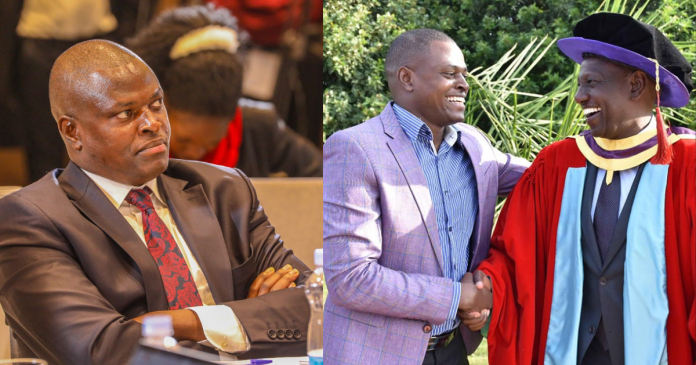Kiharu MP Ndindi Nyoro has launched a scathing attack at President William Ruto’s economic approach, cautioning the Kenya Kwanza administration against over-reliance on debt and taxation as tools for economic growth.
Speaking on Tuesday, April 15, during the launch of a shadow budget ahead of the 2025/2026 budget, Nyoro said the country was heading down a dangerous fiscal path that could end in economic disaster. He warned that Kenya was just a few steps away from defaulting on its loans.
The Laffer Curve and tax fatigue
“One way you cannot get out of the hole is by continuing to dig it, increasing tax rates does not always lead to higher revenue, it is a fallacy. At a certain point, you reach the Laffer Curve, where additional tax increases result in diminishing returns. The more taxes rise, the more economic decisions are distorted,” stated Nyoro.
Until February 2025, Nyoro chaired the powerful Budget and Appropriations Committee, a role in which he had previously defended the very policies he is now criticizing—those aimed at narrowing budget deficits through increased taxation and borrowing. Kenya’s public debt currently stands at around KSh 11 trillion and is expected to balloon to KSh 12 trillion by the end of the 2025/2026 financial year.
The Laffer Curve was popularized by economist Arthur Laffer, who stated that when taxes are zero, then revenue is also zero, and when you increase taxes to 100 percent, the revenue remains at zero. According to Laffer, cutting taxes can result in increased revenue from taxes.
He illustrated this with a hypothetical scenario:
“If I were planning to buy a car but realized that my income has already been taxed heavily, I may hold back that expenditure. This means that even the smaller revenue the government could have collected from that transaction will now be lost.”
Nyoro warned against crafting tax policy based on guesswork rather than grounded research.
“As a country, we must take this seriously when crafting tax and revenue policies, ensuring that decisions are data-driven and research-based, rather than arbitrary guesses about revenue potential,” he said.
High taxes, low revenue
Citing data from recent years, Nyoro questioned the effectiveness of the tax hikes introduced through the Finance Bills of 2022 and 2023. Despite the new levies, he said, revenue as a share of GDP had not improved—in fact, it had dropped.
“In 2019–2020, the revenue-to-GDP ratio was around 15%. In 2023, it dropped to 14%, and the current year’s figure stands at approximately 14.7%. Ideally, strong tax policies should result in commensurate revenue growth,” Nyoro noted.
He explained the ripple effect of high taxation on the economy, pointing to how heavily taxed income limits the ability of earners to support their families and stimulate local economies.
“Let’s say someone loses Sh8,000 to PAYE. That’s money they would have sent to family members in Nyamira or Kisii. Without that transfer, those recipients can no longer buy sugar or other essentials. That reduces transactions and limits VAT collections. Cutting disposable income through high taxes shrinks overall revenue collections, despite the intention to increase government revenue,” Nyoro said.
The Kiharu MP also took a jab at protectionist economic policies, drawing parallels with Nigeria. “Take the case of Nigeria, an economy that has produced some of Africa’s richest entrepreneurs, particularly in Lagos. Nigerian cement companies thrived due to import duties imposed on competing products,” he said.
While Nyoro acknowledged that protecting domestic production can be a sound economic strategy, he warned of its long-term consequences if overused.
“When a country overuses tariffs, it risks reducing competition rather than fostering efficiency,” he said. “At the beginning of this year, Nigeria had the highest cement prices in Africa, despite being home to some of the biggest producers. That’s the danger of prolonged protectionism.”
He also invoked the legacy of the late President Mwai Kibaki, holding him up as a model of economic prudence. “Figures don’t lie. You realize that the accolades given to President Mwai Kibaki—he actually deserves more. Kenya has never had a more prudent president,” Nyoro said, adding that comparative analysis of Kenya’s economy since Kibaki’s departure in 2013 shows a clear decline in fiscal responsibility.
Nyoro urged the current leadership to focus more on the real work of economic stewardship rather than playing political games.
“If there is one threat that we face as a country today, it is debt. I don’t think we are taking the seriousness of this matter the way we should. And I also don’t think those who are responsible are communicating enough about the problem we have with debt,” he said.
Ndindi Nyoro gains Sh. 198 million in 6 months from Kenya Power shares
Don’t take shylock loan to pay off bank loan
In a metaphor highlighting the government’s alleged fiscal mismanagement, he remarked, “You cannot go and take a loan from a shylock, pay a bank, and then go home expecting people to celebrate you for taking a loan with an interest of 20% to pay off the one you had that was at 12%.”
He said this in reference to Kenya’s successful payoff of Sh 116.3 billion Eurobond in March 2025.
He warned that such decisions were not sustainable. “We are not progressive enough and prudent enough as a country. In just a few months, we will see the ramifications. We do not want Kenya to become a case study like Sri Lanka in the years 2022–2023.”
Nyoro’s remarks are set to stir debate within Kenya Kwanza circles, especially given his former alignment with President Ruto’s economic policies.








